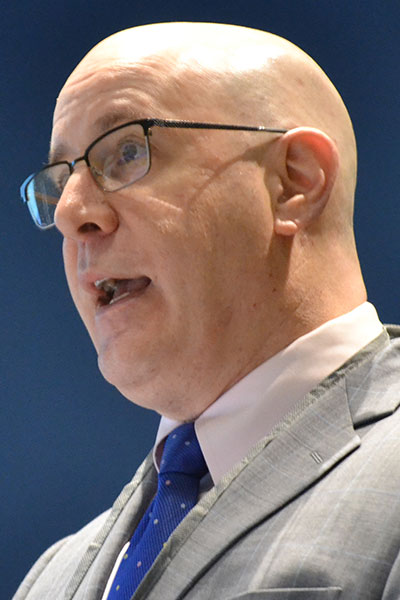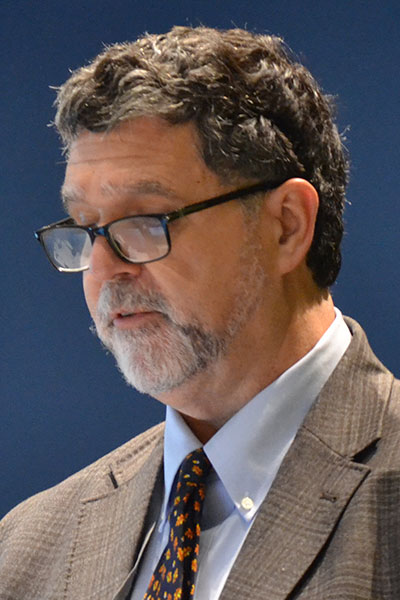Admittedly, the title was hyperbolic, but the presenters of the CHEST 2025 session Health Care MBA in an Hour: Negotiation, Strategy, and Leadership Skills, held Wednesday, October 22, in Chicago, stressed that important skills in the business world translate to leadership and professional growth in health care.

There are some key differences, however, between traditional management philosophy and health care leadership, said CHEST President-Elect Neil Freedman, MD, FCCP, President of Specialty Care at Endeavor Health Medical Group and Clinical Professor of Medicine at the University of Chicago Pritzker School of Medicine.
“For example, how do physicians become leaders?” Dr. Freedman asked. “They’re told: ‘Hey, you’re a great clinician—tag, you’re it! Now you have a title and are a leader.’ Most people don’t get the training they need for this, unlike our administrative counterparts.”
Another difference is that most clinicians tend to approach—and should approach—issues with a different set of priorities when they go into negotiations.
“There’s always talk of a win-win situation, but it’s not always a win-win,” he said. “There is give-and-take, and hopefully at the end of the day the win is for the patients. It’s not whether you win as the person negotiating, it’s whether at the end of the day you get the resources you need and the teams you need to improve outcomes for the patients.”
Nonetheless, traditional business administration skills and approaches can provide important skills. Dr. Freedman reviewed literature and drew on notes contributed by Holly Keyt, MD, MBA, FCCP, Associate Professor of Medicine and Director of Lung Transplant Program at UT Health San Antonio, to provide these pointers for negotiations in health care leadership scenarios:
- Define what success looks like before you come to the table.
- Prepare for negotiations with the same deliberation as you prepare for a clinical procedure.
- Know in advance at what point you will walk away.
- Anchor your position with data.
- Listen more; talk less.
- Negotiate for packages, not for separate goals one by one. (This also applies when negotiating individual salary and compensation.)
- Ask for more than you want, within reason.
- Draw on emotional intelligence; know your own strengths and weaknesses and understand the goals of the people with whom you work and negotiate.
- Accept new challenges but ask what current tasks can be set aside to free up focus.
Lead with “patient first”—focus on improving outcomes for the patients.

Some of the most effective management books provide direct lessons for clinician leadership focused on prioritizing patient care, driving change, and motiving health care teams, said Christopher Carroll, MD, FCCP, Professor of Pediatrics at the University of Florida College of Medicine-Jacksonville and Medical Director of the Pediatric Intensive Care Unit at Wolfson Children’s Hospital.
Dr. Carroll highlighted lessons from “Drive” by Daniel H. Pink and “Multipliers” by Liz Wiseman. Pink’s framework of motivated work as an overlap of mastery, autonomy, and purpose can be applied by clinical leaders in daily routines, Dr. Carroll said. For example, enabling unit-based committees to provide team members on-the-job leadership training can develop “mastery”; asking nurses to design their own bedside handoff checklists using national quality and safety standards can facilitate “autonomy”; and reframing early discharges not as “throughput,” but rather as expedited reunions of patients with their families can amplify “purpose.”
There are many ways to approach this, Dr. Carroll noted, but the general intent is to see leadership not as a title but as a mindset that builds up capable teams and empowers them to provide improved patient care.
“Clinician leadership means unlocking the potential of others,” Dr. Carroll said. “It is about amplification and empowering change, not authority. Leveraging how people are motivated and their own particular geniuses can empower your colleagues to achieve their best.”

Call for Topics Is Open
Feeling inspired by all the great sessions in Chicago? Help shape the curriculum for CHEST 2026, October 18 to 21 in Phoenix, by submitting topic ideas from areas you’re passionate about, topics affecting your practice, or new technologies you’d like to learn more about. The submission deadline is Tuesday, December 2, at 2 pm CT.


